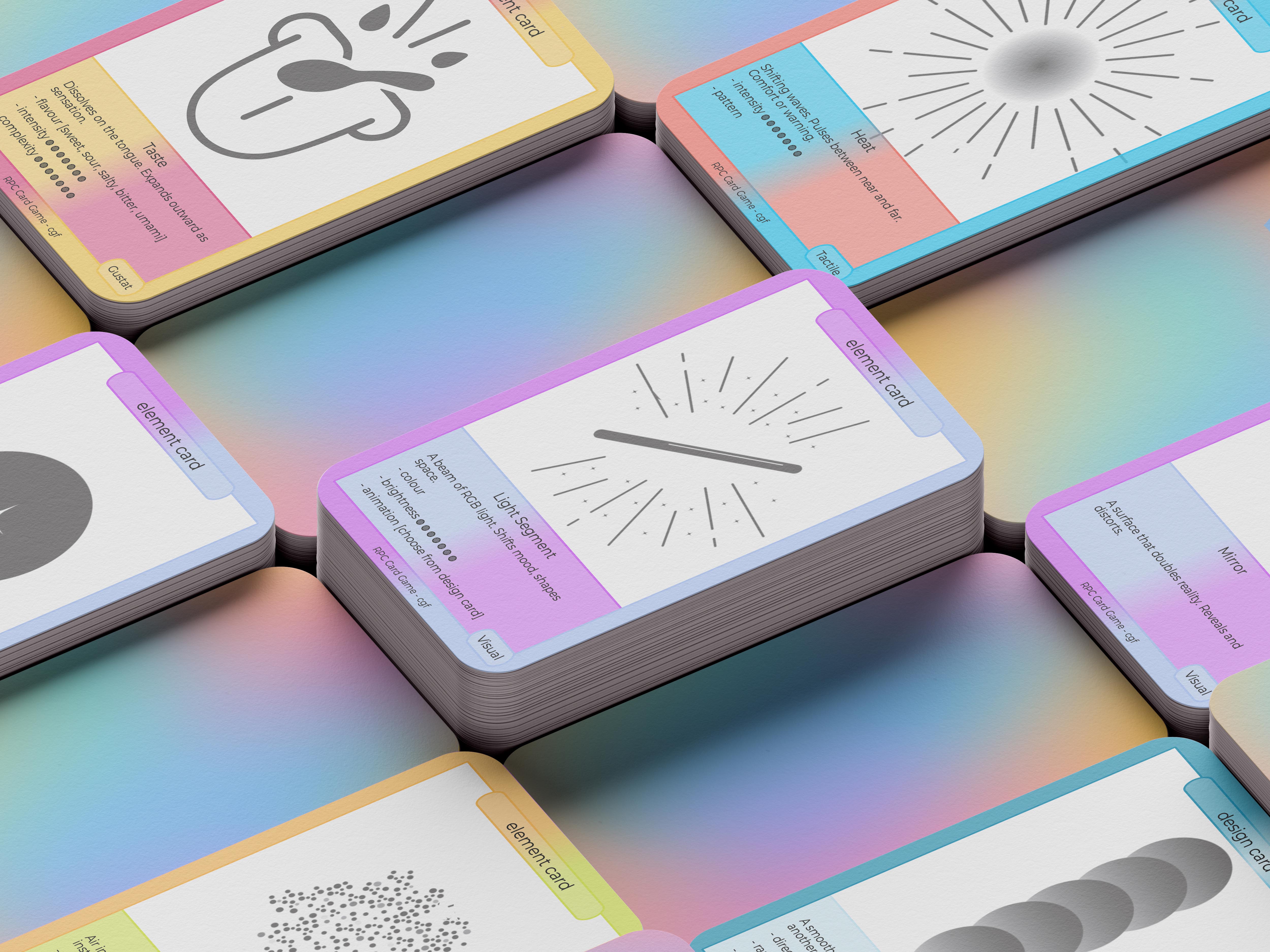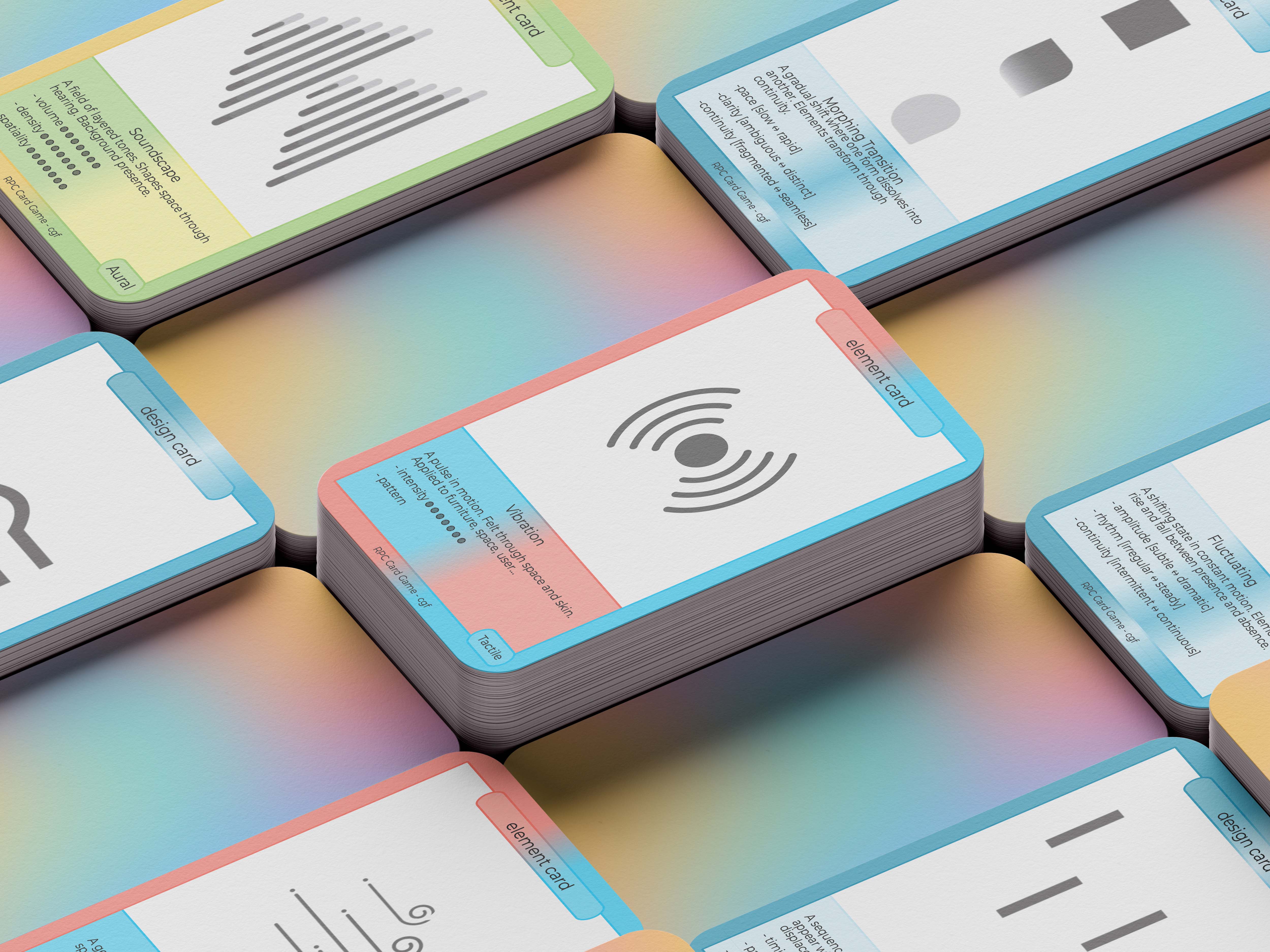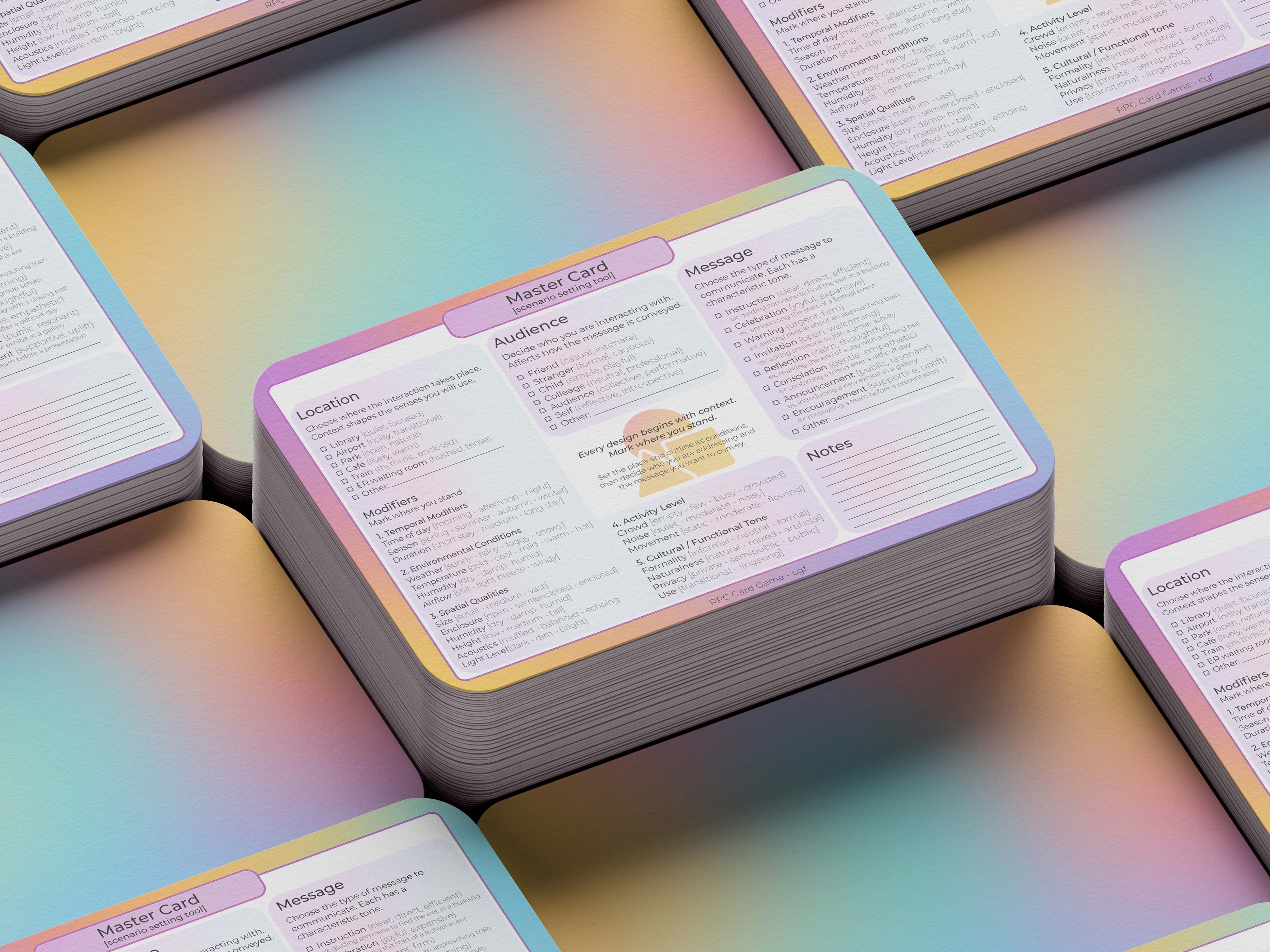Reduced Perceptual Cues
Design Card Deck
guided design tool for composing atmospheric multisensorial experiences
Reduced Perceptual Cues Research
Keio University, KMD-EM
September 2025
+ download here

The Reduced Perceptual Cues (RPC) Card Deck is a conceptual and design tool developed to explore how sensory experiences can be constructed from minimal and abstracted inputs.
Rather than addressing architecture through walls, materials, or forms, the deck shifts focus toward atmospheric composition—working with light, sound, airflow, temperature, and reflection as the raw matter of spatial experience.
Each card invites designers, artists, and researchers to consider perception itself as the medium of construction.
Reduced Perceptual Cues(RPC)カードデッキは、最小限で抽象化された入力からどのように感覚的な体験を構築できるかを探るために開発された、思索的かつデザイン指向のツールです。
このデッキは、壁や素材、形態といった建築的要素ではなく、光、音、気流、温度、反射といった空間体験の原素材としての現象に焦点を移し、雰囲気の構成を試みます。
各カードは、デザイナー、アーティスト、研究者に対して、「知覚そのものを構築の媒体として考える」ことを促します。
Rather than addressing architecture through walls, materials, or forms, the deck shifts focus toward atmospheric composition—working with light, sound, airflow, temperature, and reflection as the raw matter of spatial experience.
Each card invites designers, artists, and researchers to consider perception itself as the medium of construction.
Reduced Perceptual Cues(RPC)カードデッキは、最小限で抽象化された入力からどのように感覚的な体験を構築できるかを探るために開発された、思索的かつデザイン指向のツールです。
このデッキは、壁や素材、形態といった建築的要素ではなく、光、音、気流、温度、反射といった空間体験の原素材としての現象に焦点を移し、雰囲気の構成を試みます。
各カードは、デザイナー、アーティスト、研究者に対して、「知覚そのものを構築の媒体として考える」ことを促します。
The RPC Card Deck emerged from the study of Reduced Perceptual Cues, a framework that examines how spaces can evoke complex sensations through limited sensory information.
By abstracting visual, aural, tactile, olfative and gustative stimuli into discrete yet combinable elements, the deck helps articulate what often remains intangible—the threshold between suggestion and perception.
The cards do not prescribe fixed outcomes.
Instead, they operate as a prompt system, a way to think through atmosphere and sensory structure.
Each composition becomes an experiment in how perception can be tuned, how attention can be guided, and how meaning emerges from reduction rather than saturation.
RPCカードデッキは、限られた感覚情報からどのように空間が複雑な感覚を喚起できるかを探る「Reduced Perceptual Cues(RPC)」の研究から生まれました。
視覚、聴覚、触覚、嗅覚、味覚といった刺激を、独立しつつも組み合わせ可能な要素として抽象化することで、示唆と知覚のあいだにある曖昧で捉えがたい閾(しきい)を言語化する手がかりとなります。
このカードは固定的な結果を指示するものではありません。
むしろ、雰囲気や感覚の構造を思考するための「きっかけ」として機能します。
それぞれの組み合わせは、知覚をどのように調整できるか、注意をどのように導けるか、そして「情報の削減」からいかに意味が立ち上がるかを探る実験となります。
By abstracting visual, aural, tactile, olfative and gustative stimuli into discrete yet combinable elements, the deck helps articulate what often remains intangible—the threshold between suggestion and perception.
The cards do not prescribe fixed outcomes.
Instead, they operate as a prompt system, a way to think through atmosphere and sensory structure.
Each composition becomes an experiment in how perception can be tuned, how attention can be guided, and how meaning emerges from reduction rather than saturation.
RPCカードデッキは、限られた感覚情報からどのように空間が複雑な感覚を喚起できるかを探る「Reduced Perceptual Cues(RPC)」の研究から生まれました。
視覚、聴覚、触覚、嗅覚、味覚といった刺激を、独立しつつも組み合わせ可能な要素として抽象化することで、示唆と知覚のあいだにある曖昧で捉えがたい閾(しきい)を言語化する手がかりとなります。
このカードは固定的な結果を指示するものではありません。
むしろ、雰囲気や感覚の構造を思考するための「きっかけ」として機能します。
それぞれの組み合わせは、知覚をどのように調整できるか、注意をどのように導けるか、そして「情報の削減」からいかに意味が立ち上がるかを探る実験となります。


The deck was first introduced in a series of workshops where participants used it to translate memories, sensations, and site-specific experiences into multisensory spatial compositions.
By combining cards on a design board, participants could visualize the relationships between cues—light interacting with mist, sound blending with movement, or temperature modulating presence.
The process revealed how minimal perceptual information can still evoke recognition, emotion, and spatial coherence.
It also demonstrated how collaboration and interpretation play a role in constructing low-definition environments, where meaning emerges collectively through sensory abstraction.
このデッキは、記憶や感覚、場所に根ざした体験を多感覚的な空間構成へと翻訳する一連のワークショップの中で初めて紹介されました。
参加者はデザインボード上でカードを組み合わせることで、手がかり同士の関係――霧と交わる光、動きと溶け合う音、存在感を変化させる温度――を可視化しました。
そのプロセスを通じて、最小限の知覚情報であっても認識や感情、空間の一体感を喚起できることが明らかになりました。
また、低解像度の環境において、意味が感覚の抽象化を通して集合的に生まれるということ、そしてその構築において協働と解釈が重要な役割を果たすことも示されました。
The RPC Card Deck is part of an ongoing research project on Reduced Perceptual Cues (RPCs) and low-definition spatial design, situated within the Informational Atmospheric Toolbox framework.
It functions as both a pedagogical and methodological tool, bridging design research, human perception, and ambient computation.
Within this framework, the deck supports:
This approach connects to broader discussions in Human–Building Interaction (HBI), ambient computing, and media architecture, contributing a new vocabulary for designing environments that communicate through subtle sensory dialogue.
RPCカードデッキは、「Reduced Perceptual Cues(RPC)」および低解像度の空間デザインに関する継続的な研究の一環として、Informational Atmospheric Toolboxの枠組みの中に位置づけられています。
それは教育的かつ方法論的なツールとして機能し、デザインリサーチ、人間の知覚、そしてアンビエントコンピュテーションの領域を橋渡しします。
この枠組みの中で、デッキは以下の探求を支援します:
このアプローチは、Human–Building Interaction(HBI)、アンビエントコンピューティング、メディアアーキテクチャにおける広範な議論とも接続し、繊細な感覚的対話によって環境をデザインするための新たな語彙を提示します。
The RPC Card Deck is available for download for designers, artists, and researchers interested in experimenting with perception-driven spatial composition.
It is being released as an open resource to encourage adaptation, remixing, and new applications across different disciplines—from architectural education to interactive media design.
+ download here
RPCカードデッキは、知覚を起点とした空間構成の実験に関心を持つデザイナー、アーティスト、研究者のために公開されています。
このデッキは、建築教育からインタラクティブメディアデザインに至るまで、さまざまな分野での応用や再構成、リミックスを促すオープンリソースとして配布されています。
+ こちらからダウンロードできます
By combining cards on a design board, participants could visualize the relationships between cues—light interacting with mist, sound blending with movement, or temperature modulating presence.
The process revealed how minimal perceptual information can still evoke recognition, emotion, and spatial coherence.
It also demonstrated how collaboration and interpretation play a role in constructing low-definition environments, where meaning emerges collectively through sensory abstraction.
このデッキは、記憶や感覚、場所に根ざした体験を多感覚的な空間構成へと翻訳する一連のワークショップの中で初めて紹介されました。
参加者はデザインボード上でカードを組み合わせることで、手がかり同士の関係――霧と交わる光、動きと溶け合う音、存在感を変化させる温度――を可視化しました。
そのプロセスを通じて、最小限の知覚情報であっても認識や感情、空間の一体感を喚起できることが明らかになりました。
また、低解像度の環境において、意味が感覚の抽象化を通して集合的に生まれるということ、そしてその構築において協働と解釈が重要な役割を果たすことも示されました。
The RPC Card Deck is part of an ongoing research project on Reduced Perceptual Cues (RPCs) and low-definition spatial design, situated within the Informational Atmospheric Toolbox framework.
It functions as both a pedagogical and methodological tool, bridging design research, human perception, and ambient computation.
Within this framework, the deck supports:
- The study of how perceptual cues can be abstracted, combined, and transferred across different environments.
- The development of systematic methods for crafting mediated spaces that operate between physical and informational layers.
- The exploration of affordance-based interaction, where users intuitively engage with sensory feedback without explicit instructions.
This approach connects to broader discussions in Human–Building Interaction (HBI), ambient computing, and media architecture, contributing a new vocabulary for designing environments that communicate through subtle sensory dialogue.
RPCカードデッキは、「Reduced Perceptual Cues(RPC)」および低解像度の空間デザインに関する継続的な研究の一環として、Informational Atmospheric Toolboxの枠組みの中に位置づけられています。
それは教育的かつ方法論的なツールとして機能し、デザインリサーチ、人間の知覚、そしてアンビエントコンピュテーションの領域を橋渡しします。
この枠組みの中で、デッキは以下の探求を支援します:
- 知覚的手がかりを抽象化し、組み合わせ、異なる環境間で転用する方法の研究。
- 物理的層と情報的層のあいだで機能する媒介的な空間を構築するための体系的手法の開発。
- 明示的な操作説明を必要とせず、感覚的フィードバックを通して直感的に関わるアフォーダンスベースのインタラクションの探求。
このアプローチは、Human–Building Interaction(HBI)、アンビエントコンピューティング、メディアアーキテクチャにおける広範な議論とも接続し、繊細な感覚的対話によって環境をデザインするための新たな語彙を提示します。
The RPC Card Deck is available for download for designers, artists, and researchers interested in experimenting with perception-driven spatial composition.
It is being released as an open resource to encourage adaptation, remixing, and new applications across different disciplines—from architectural education to interactive media design.
+ download here
RPCカードデッキは、知覚を起点とした空間構成の実験に関心を持つデザイナー、アーティスト、研究者のために公開されています。
このデッキは、建築教育からインタラクティブメディアデザインに至るまで、さまざまな分野での応用や再構成、リミックスを促すオープンリソースとして配布されています。
+ こちらからダウンロードできます